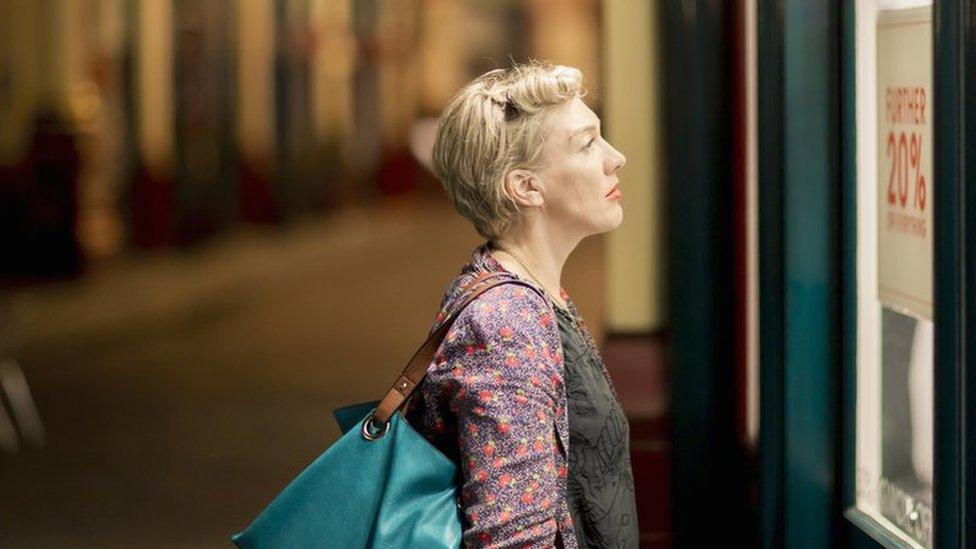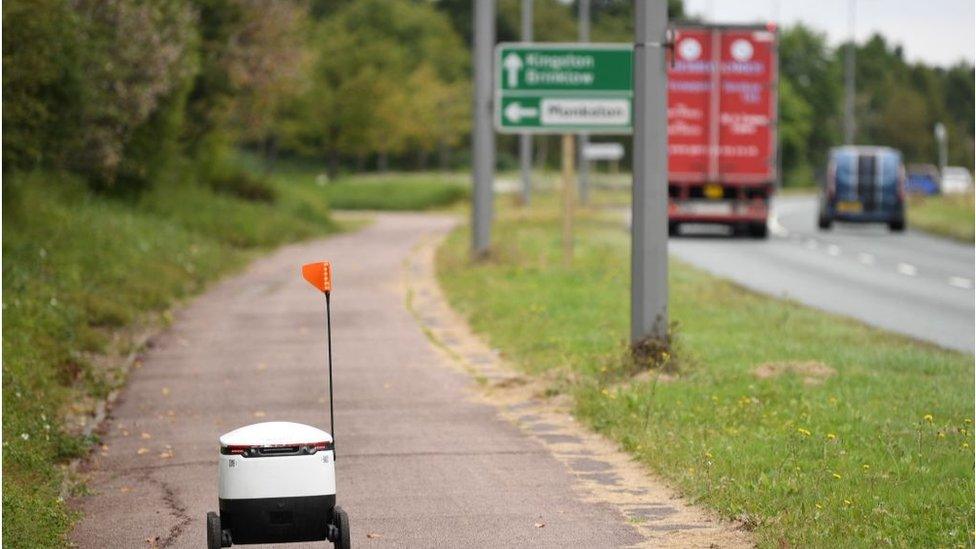The deep rooted problem holding back the UK economy
- Published

The economic shockwaves of the pandemic, and the Ukraine war appear, finally, to be calming.
Inflation has fallen for three months in a row and pay is now almost matching the pace of price rises.
Interest rates, which had been rising since late 2021 and making life tough for struggling households and families alike, were finally put on pause earlier this month, with Bank of England boss Andrew Bailey saying there were increasing signs higher rates were beginning to to rein in UK inflation.
And even in the toughest of environments - three prime ministers in one year and a worldwide pandemic - the UK economy has shown more resilience than had been expected, managing to avoid a recession.
While the economy is not quite free of these three years of relentless rolling crises, the path out of this could now be clearing, if the jobs market and oil prices calm.
But when the storm subsides, it will reveal more deep-rooted challenges. The future of the economy and prosperity depends on investment spending. The UK has an underinvestment crisis, and it affects both the private and the public sector.
No flying cars yet
A recent trip to Milton Keynes in the south of England is one of the best places to see all the challenges and opportunities in Britain's faltering record on long-term investment.
This 1960s city is where long-term economic growth will happen. The city, the original "new town" created to house baby boomer Londoners, is now plugged into the future of high tech, high investment growth.
Two hundred shopping trolley sized robots trundle down the leafy cycle paths delivering groceries, parcels and fast food. Hire cars can be summoned to drive themselves to your location.
There are no flying cars just yet, but the council and the local hospital are trialling delivery of medicines via drone. It might sound like an episode of the Jetsons, the futuristic 1960s American cartoon, yet some parts of the city feel dated.
Locals bristle at the city being called a "concrete jungle". There is a lot of greenery as well as 1960s and 70s concrete. But some of what was new and gleaming back then, now needs the funding to be renewed and rebuilt, half a century on, both in this city, and across the country.

The UK lags other big economies on robot use
ABB a Swedish-Swiss manufacturing company are training advanced industrial robots here to work with people, on picking, packing, sorting, welding. Its managing director, Dermot Lynch, says investment has been poor.
When it comes to deployment of robot technologies, the latest figures show the UK is at the bottom of the G7 advanced economies which include Canada, France, Germany, Italy, Japan and the US.
Mr Lynch says the key is to get these technologies, already widely used in car factories, into small and medium sized businesses (SMEs). "The robots code themselves by recording the actions of a human operator. We see that being particularly important in SMEs where there may not be a lot of technical skill."
Productivity puzzle
British business does not now invest as much as other major economies either. The UK was in second place in the G7 for private investment, as a share of the economy in the mid 1990s, but has now fallen behind them all.
The long-term impact of this is low productivity - we take more time to produce less than our rivals -which results in low growth, low real wages, and then problems raising money for public services.
There is a hope that robotics and artificial intelligence could be the technologies that solve the productivity puzzle.
For Chancellor Jeremy Hunt, correcting poor business investment is the main aim of next month's Autumn Statement. Various tax changes have been tried, including the "superdeduction" tax break, which gave businesses investing in certain types of equipment, like machinery, a much higher tax reduction than usual.
This spring, Mr Hunt announced a new scheme to allow every pound invested by businesses in IT equipment, plants or machinery to be deducted in full from taxable profits. The "full capital expensing" policy allows companies for three years to deduct spending on investment from profits, meaning they have to pay lower amounts of corporation tax.
But the productivity problem remains stubborn.
The other aim of the chancellor with his Autumn Statement is his pledge to balance the borrowing numbers.
'Declining public realm'
This is putting pressure on public spending reflected in the recent discussion over the future of the HS2 rail link due to the soaring cost of the project. Capital investment in transport is due to go up sharply, because of HS2, even as it has hardly gone up for schools.
A Milton Keynes secondary school head showed me what she called one of the worst examples of the schools concrete crisis: a sports hall, built in the early 1990s, with a bowing RAAC concrete roof.
This has sparked criticism of a "declining public realm", and whether the fabric of public services in general are up to scratch.
Public investment has been low in recent years, and was cut after the financial crisis as part of the coalition's austerity drive. Ahead of the last general election, former Prime Minister Boris Johnson made a push to increase this to 3% of the size of the national economy - the long term average.
But the plans now are to cut that back after next year with a cash freeze brought in to help calm markets after last year's mini budget which sparked turmoil on financial markets. Net public investment will fall from 2.9% of our national income to 2.1% over the next four years.
Lower investment also puts the UK's pledge to meet net zero and stop adding to the total amount of greenhouse gases in the atmosphere by 2050 in jeopardy.
This city is benefiting from a new £760m East West rail link connecting it to Oxford. The plan is to spend billions more on a further connection to Cambridge. This would be a huge boost to growth, connecting two world-beating research centres directly to a city with the space and housing to grow. But with capital spending squeezed, all major transport projects are now being carefully scrutinised.
The government's plan appears to be to get the private sector to do the heavy lifting of investing in our economic future. There are exciting opportunities for this in Milton Keynes and beyond that could help crack our poor productivity record. Turning this round is essential for long term growth. But doing so while public investment is being squeezed, is quite the challenge.
Related topics
- Published27 September 2023

- Published21 September 2023
